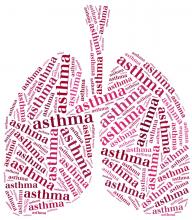in preventing the exacerbation from occurring, according to the results of two trials in adults and children.
Presented at the joint congress of the American Academy of Allergy, Asthma, and Immunology and the World Asthma Organization and simultaneously published in the March 3 online edition of the New England Journal of Medicine, one study explored the effect of quadrupling the inhaled glucocorticoid dose in adults and adolescents with asthma, while the other looked at quintupling the dose in children.
The first study involved 1,922 participants who were aged 16 years or above, who were receiving inhaled glucocorticoids, and had experienced at least one asthma exacerbation in the previous year. They were randomized to a self-management plan that instructed them to either take quadruple their usual dose of inhaled glucocorticoids at the first sign of worsening asthma – more use of reliever inhaler, difficult sleeping, or reduced peak flow – or continue using their usual dose of inhaled glucocorticoids.At 1 year, there was a significantly lower incidence of severe asthma exacerbations in the group who used the higher dose of inhaled glucocorticoids (45% vs. 52%; hazard ratio, 0.80; P = .001) after adjusting for age, sex, and peak flow measures at randomization.


